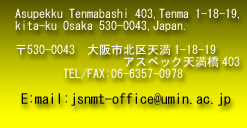|
|

In 1980, the JSNMT was established to contribute to the advancement of
healthcare in Japan and to the quality of our members by studying nuclear
medicine technologies.
The JSNMT is now an academic society with 850
members. Our members include radiological technologists, clinical technologists,
pharmacists, and physicians who are engaged in nuclear medicine healthcare,
persons in charge of sales and research of medicines and medical equipment, and
educators at universities.
The JSNMT membership comprises a regular
member, an associate member, and a supporting member.
Anyone is eligible for
membership if he/she agrees with the purpose of the JSNMT.
However, for those
who work in a job rotation, joining our membership is not an easy
matter.
Thus, the JSNMT introduced an associate membership so that many
experts can have a number of opportunities to give research presentations, to
listen to presentations by others, and to join our membership.
By
dividing the nation into eight blocks, the JSNMT has organized regional
societies (at present, a regional society has not been established in
Hokkaido).
These regional societies and the JSNMT should work together to
make the JSNMT more active.
Information should actively be exchanged between
the JSNMT and regional societies.
This should enable us to make the most of
ideas generated in the regional societies at the JSNMT and to make what is
available at the JSNMT known to regional societies, which is one of the reasons
we set up regional societies.
Recently, we have more participants from our neighbor, Korea, as well as
from advanced nations, thanks to support by JICA, making the JSNMT more
international. We thus expect that the JSNMT will hold an international
summit in Japan.

The JSNMT sponsors an academic convention and a general meeting once a year. In
addition, the JSNMT sponsors a one-day lecture course dealing with a selected
subject as a seminar for nuclear medicine technologies.
Moreover, the JSNMT
publishes a journal called Nuclear Medicine Technology five times a year. The
latest is the 25th issue.
In the publishing business, the JSNMT published a
book titled Technologies for Nuclear Medicine Examinations.
Currently, the
third edition is available and is used in both clinically and in medical
schools.

The JSNMT established a qualification system for nuclear medicine technologists
for enhancing the quality of our members and experts. So far, almost 200 members
have become qualified.
A member is qualified if he/she scores 500 points on
an evaluation of participation in or presentations at the JSNMT convention,
papers accepted in our journal, experience, and other factors.
This
qualification is not a nationally recognized qualification, but should be useful
in the clinical setting. In the future, we expect to make it a publicly
recognized qualification by joint qualification with related societies.

Information technology has been advancing worldwide, and the JSNMT has started
our website to disseminate information.
The Information Techology Management
Committee is playing a central role in our website.
Mostly, the current
contents are for communications among members and for posting our information to
persons other than members. Later, we will post information accessible to the
world through our website.

The International Exchange, Research and Dispatch Committee has organized a
program for dispatching outstanding persons to other countries.
The committee
supports our members who plan to give a presentation at the SNM or ESNM or who
plan an overseas visit by assuming part of their costs.
A number of our
members have been given an outstanding paper award by the SNMT, indicating the
high level of our research.

In 2000, the JSNMT announced "The 2000 declaration" for the coming 21st
century.
In "The 2000 declaration," we pronounced that we should make every
effort to contribute to healthcare and welfare in the 21st century and, from the
social perspective, to enhance and spread the knowledge and technologies
regarding radiation medicine, nuclear medicine examinations in particular, to
Japanese society.
We also pronounced that we should establish an ongoing
educational system for our members and create an environment that should enable
experts to be responsibly engaged in their jobs.
To achieve these, and to
contribute to healthcare and welfare, the JSNMT is striving for significant
achievements in medical care, research, education, and transmission of
information. |

